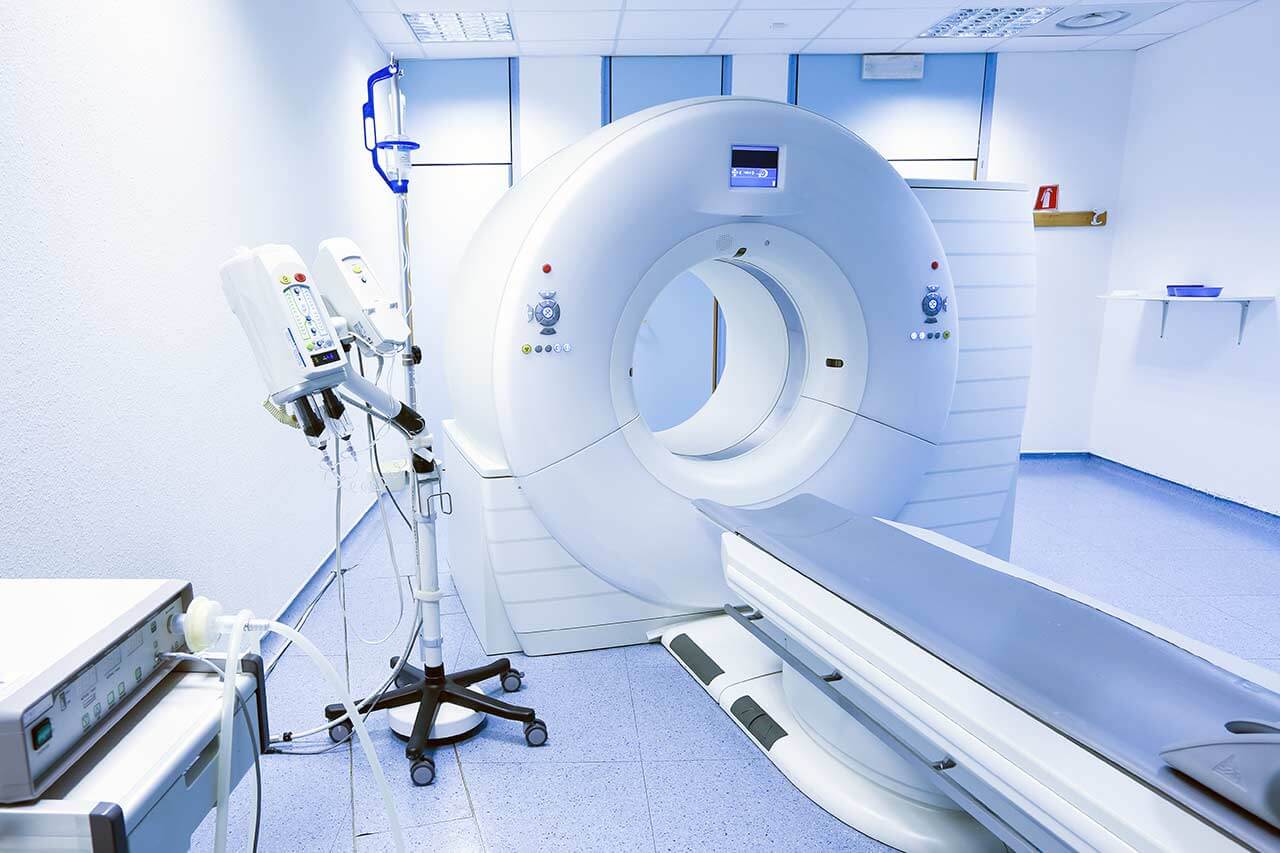
The program includes:
- Initial presentation in the clinic
- clinical history taking
- review of medical records
- physical examination
- laboratory tests:
- complete blood count
- general urine analysis
- biochemical analysis of blood
- inflammation indicators (CRP, ESR)
- indicators blood coagulation
- neurological examination
- functionality x-ray
- CT/MRI scan
- neuropsychological tests (on indications):
- ENMG (electroneuromyography)
- EEG (electroencephalography)
- SEPs (somatosensory evoked potentials)
- VEPs (visually evoked potentials)
- BAEP tests (brainstem auditory evoked potential)
- preoperative care
- resection of subdural brain hematoma
- blood transfusions (if needed)
- 5-days intensive care unit stay
- postoperative MRI control
- symptomatic treatment
- control examinations
- neurorehabilitation 10 days
- the cost of essential medicines and materials
- nursing services
- full hospital accommodation
- developing of further guidance
Required documents
- Medical records
- X-ray examination, MRI/CT scan (if available)
Service
You may also book:
 Price:
Price:
About the department
The Department of Adult and Pediatric Neurosurgery at the University Hospital Heidelberg offers the full range of diagnostics and treatment of diseases of the central and peripheral nervous system. The medical institution occupies a leading position in this sector in Europe. The department is headed by Prof. Dr. med. Andreas Unterberg.
The neurosurgeons of the department have at their disposal four high-tech operating rooms, in which more than 3,500 interventions are performed annually. Active clinical and experimental research activities, as well as close cooperation with national and international reputable research centers, promote the introduction of innovative treatment techniques that are available only in a few clinics in the world.
The exceptional technical equipment of the department, as well as well-coordinated interaction of a multidisciplinary team of doctors are a necessary prerequisite for performing the most safe and effective surgical interventions. The specialists of the department have a wealth of knowledge and experience in performing brain and spinal cord surgeries, deep brain stimulation and other stereotactic operations, as well as in providing intensive neurosurgical care, treating neurosurgical diseases in children of all age groups. When performing surgical treatment, the doctors use neuronavigation systems, neuromonitoring, intraoperative imaging to ensure the best possible accuracy and the absence of postoperative complications.
The service range of the department includes:
- Diagnosis and treatment of diseases, injuries of the brain and spinal cord
- Brain tumors
- Glioma
- Pituitary adenoma
- Acoustic neuroma
- Meningioma
- Brain metastases from the tumors of other localization
- Skull base tumors
- Spinal tumors
- Neuroma
- Meningioma
- Ependymoma
- Astrocytoma
- Metastasis of lung or breast cancer
- Traumatic brain injuries
- Spinal malformations (for example, spina bifida)
- Brain tumors
- Functional neurosurgery
- Dystonia
- Parkinson's disease
- Essential tremor
- Diagnostics and treatment of spinal diseases
- Herniated discs
- Spinal stenosis
- Vertebral displacement
- Diagnostics and treatment of cerebral aneurysms, vascular malformations
- Neurosurgical pain therapy
- Surgical pain therapy and peripheral nerve damage
- Surgical treatment of chronic headaches and facial pains
- Diagnostics and treatment of neurosurgical diseases in children
- Hydrocephalus
- Spasticity
- Cerebral palsy
- Brain and skull malformations
- Skull malformations (craniosynostosis)
- Encephalocele
- Meningocele
- Complicated malformations of the anterior part of the nasal cavity
- Arachnoid cyst
- Dandy-Walker malformation
- Malformations of the spinal cord and spine
- Myelomeningocele
- Myelozysis
- Meningocele
- Diastematomyelia
- Lipomyelomeningocele
- Tethered spinal cord syndrome
- Spina bifida
- Intrauterine neurosurgical intervention in spina bifida (fetal surgery)
- Oncological diseases of the central and peripheral nervous system in children
- Pilocytic astrocytoma
- Medulloblastoma
- Ependymoma
- Craniopharyngioma
- Tumors developing during the first year of life
- Pituitary adenoma
- Brain stem glioma
- Germ cell tumors (for example, germinomas or teratomas)
- Other medical services
Curriculum vitae
Education
- 10.1974 - 03.1977 School of Medicine, Justus Liebig University Gießen, Germany.
- 04.1977 - 05.1981 School of Medicine, Ludwig-Maximilian University of Munich, Germany.
- 18.05.1981 Final examination, Ludwig-Maximilian University of Munich, and approbation, Munich, Germany.
- 07.1991 Board certification in Neurosurgery, Berlin, Germany.
- 06.1997 Board certification in Neurosurgical Intensive Care.
Academic Degrees
- 10.1982 Doctoral thesis: "The kallikrein-kinin-system as mediator of brain edema" (summa cum laude), Ludwig Maximilian University of Munich.
- 02.1988 PhD thesis: "Alterations of blood-brain-barrier function and cerebrovascular tone by mediators of the secondary brain damage", Ludwig Maximilian University of Munich, Germany.
- 12.1991 Professor of Neurosurgery, Free University of Berlin, Germany.
- 04.2003 Chairman and Professor of the Department of Neurosurgery, University of Heidelberg, Germany.
Postdoctoral Training
- 07.1981 - 04.1982 Research Fellow, German Research Foundation (DFG), Institute for Surgical Research, Ludwig Maximilian University of Munich, Germany.
- 05.1982 - 10.1985 Research Fellow, Institute for Surgical Research, Hospital Grosshadern, Ludwig Maximilian University of Munich, Germany (Director: Prof. Dr. med. Dr. h.c. W. Brendel).
- 11.1985 - 12.1986 Research Fellow, German Research Foundation (Un 56/1-1), Department of Neurosurgery, Medical College of Virginia, Richmond, USA (Directors: Prof. Young, Prof. Marmarou).
- 01.1987 - 05.1990 Resident, Department of Neurosurgery, Hospital Grosshadern, Ludwig Maximilian University of Munich, Germany (Director: Prof. Dr. F. Marguth).
Academic Appointments
- 05.1990 - 12.1991 Assistant Professor, Department of Neurosurgery, University Hospital Rudolf Virchow, Free University of Berlin, Germany (Director: Prof. Dr. W. R. Lanksch).
- 12.1991 - 03.2003 Professor of Neurosurgery, Department of Neurosurgery, University Hospital Rudolf Virchow, Humboldt University of Berlin, Germany.
- 10.1995 - 03.2003 Vice Head, Department of Neurosurgery, Charité.
- Since 04.2003 and up to now, Head of the Department of Adult and Pediatric Neurosurgery, University Hospital Heidelberg, Germany.
Research Interests
- Secondary brain damage following trauma and ischemia.
- Therapeutic studies of brain edema.
- Cerebral blood flow, metabolism and MR-spectroscopy following experimental head injury.
- Monitoring of intracranial pressure, cerebral perfusion pressure and cerebral oxygenation following severe head injury.
- Therapeutic studies in severe head injury.
- Microdialysis following subarachnoid hemorrhage and head injury.
- Intraoperative imaging.
Clinical Interests
- Neuro-Oncology.
- Vascular neurosurgery.
- Pituitary surgery.
- Skull base surgery.
- Neurotraumatology.
- Neurosurgical intensive care.
Awards and Honors
- 09.1982 Travel Award of the European Society for Microcirculation.
- 09.1983 E.K. Frey Award of the German Society of Internal Intensive Care.
- 05.1987 Poster Award, American Association of Neurological Surgeons (AANS).
- 09.1988 Upjohn Award for Neurosurgical Research, European Association of Neurosurgical Societies (EANS).
- 01.1995 Member of the International Expert Group "Guidelines in the Management of Severe Head Injury".
- 07.1995 Investigator Award, International Neurotrauma Society.
Memberships and Activities in Scientific and Professional Societies
- President of the German Society of Neurosurgery.
- Member of the Executive Board, German Interdisciplinary Association for Intensive and Emergency Care.
- Elected President of the German Society of Neurological Intensive Care.
- Euroacademia Multidisciplinaria Neurotraumatologica.
- Member of the Executive Committee, European Brain Injury Consortium.
- International Society for Brain Edema.
- International Neurotrauma Society.
Photo: (с) depositphotos
About hospital
According to Focus magazine, the University Hospital Heidelberg ranks among the top five hospitals in Germany!
The hospital is one of the most advanced and reputable medical institutions not only in Germany but throughout Europe. There are more than 43 specialized departments and 13 medical institutes which cover all fields of modern medicine. A distinctive feature of the hospital is the presence of unique therapeutic methods for the treatment of complex and rare clinical cases.
Due to successful clinical practice, the hospital has been holding leading positions in the international medical arena for many years. The basis for this popularity is the combination of the very latest technologies, competent specialists, and active research activities, which allows introducing of revolutionary diagnostic and treatment methods, which save lives.
In addition to the outstanding medical achievements, it is worth noting a particularly friendly and pleasant atmosphere, and respectful attitude towards the patient. Both doctors and nursing staff make every effort to meet all the needs and wishes of the patient, pay due attention to each clinical case, and have personal communication with the patient, which contributes to a positive treatment result.
Photo: (с) depositphotos
Accommodation in hospital
Patients rooms
The patients of the University Hospital Heidelberg live in comfortable single and double rooms designed in bright colors. Each room is equipped with an ensuite bathroom with a shower and toilet. The patient rooms are quite spacious, they have a table with chairs for receiving visitors. Roomy wardrobes are provided for storing personal belongings. It is possible to connect to the Internet. In addition, the hospital offers enhanced-comfort rooms with a safe, refrigerator, and upholstered furniture. Patients have 24-hour access to the services of medical personnel.
Meals and Menus
The patient and his accompanying person have a daily choice of three menus. If you for some reason do not eat all the products, you will be offered an individual menu. Please inform the medical staff about your dietary preferences prior to the treatment.
Further details
Standard rooms include:
Religion
The religious services are available upon request.
Accompanying person
During the inpatient program, an accompanying person may stay with you in a room or hotel of your choice.
Hotel
During the outpatient program, you may live in a hotel of your choice. The managers will help you choose the most suitable options.
The hospital offers a full range of laboratory tests (general, hormonal, tests for infections, antibodies, tumor markers, etc.), genetic tests, various modifications of ultrasound scans, CT scans, MRI and PET / CT, angiography, myelography, biopsy and other examinations. Treatment with medications, endoscopic and robotic operations, stereotaxic interventions is carried out here, modern types of radiation therapy are also used. The hospital offers patients all the necessary therapeutic techniques.
- Endovascular treatment of liver pathologies with LigaSureTM, Ultracision® and Habib®-Sealer devices
- Correction of chest deformities in children (Nass operation)
- Minimally invasive direct coronary artery bypass grafting
- Replacement of ascending aorta (David procedure)
- Operations using the da Vinci robotic system
These are primary lung tumors and metastases in the lungs, benign and malignant liver pathologies, thyroid pathologies, gastroesophageal reflux disease, heart rhythm disturbances and heart failure, infertility, fibromyalgia, damages and pathologies of large joints, polyneuropathy and other diseases.
- Thoracic surgery
- Cardiac surgery
- Urology
- Orthopedics and traumatology
- Obstetrics and gynecology
The hospital's team consists of more than 13,000 highly qualified employees


